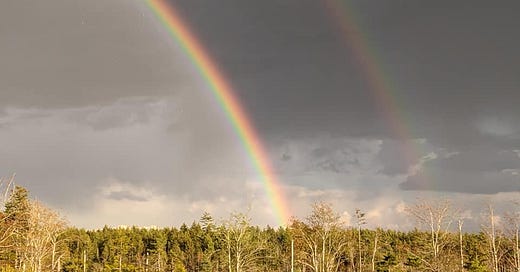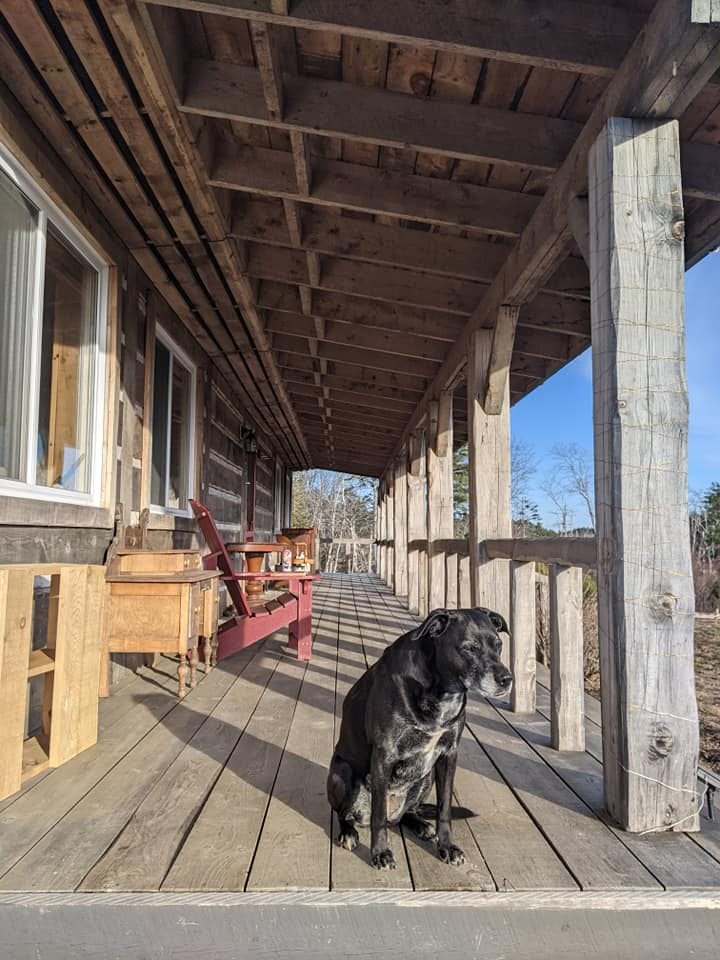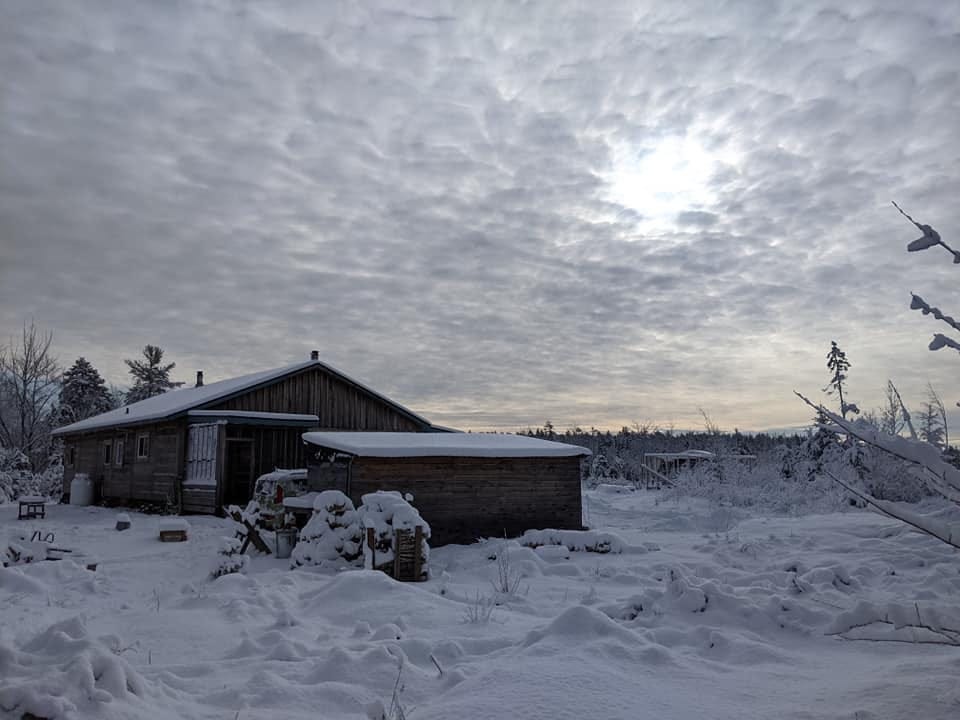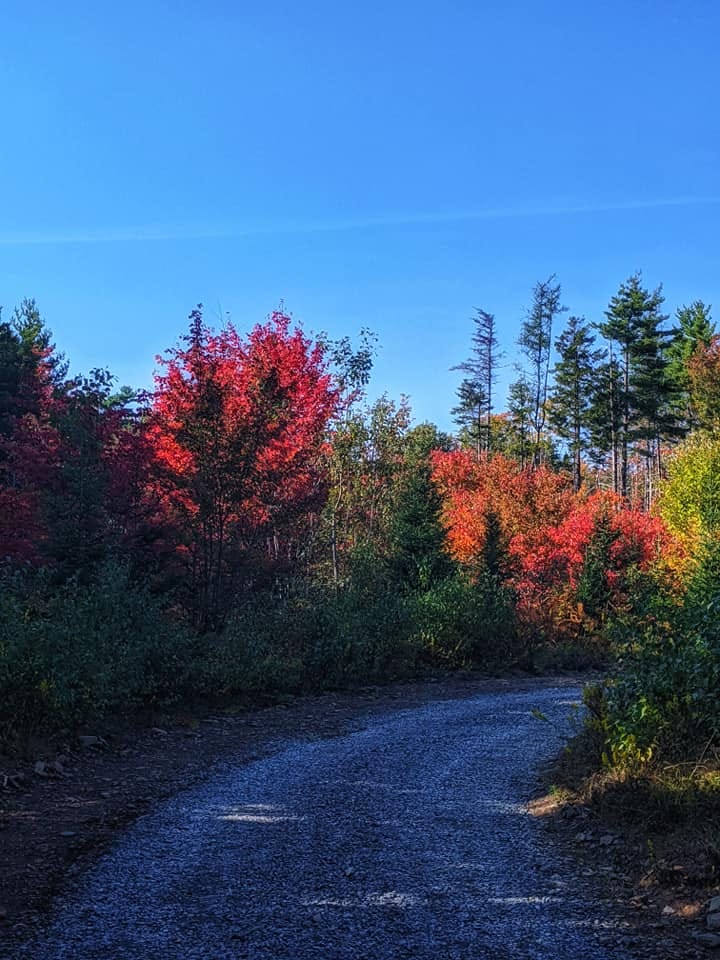A double rainbow over the Two Dog Marshlands, our off-grid home.
It’s been slightly more than a year since we moved off-grid. May 14 marked our first anniversary at Two Dog Marshlands, the name we gave our 64 acres of woods and water.
In many respects, when it came to moving off-grid, I was one of the most unlikely individuals ever. I’m notoriously incompetent with tools (that’s for a later post), spent most of my life in cities, and was not what you would call self-sufficient.
In fact, it’s probably a miracle I’ve made it to this stage of my life, much less living a life off the grid.
Growing up in an upper-class neighbourhood in Toronto was hardly preparation for going back to the land. Neither was living on my own from age 16 when one year I largely existed on Mr. Submarine subs, Harvey’s hamburgers, and popsicles.
And yet, strangely, that became its own source of my resiliency and resourcefulness, learning how to survive in the world at large. For a time I was itinerant. Like Raymond Carver (who is an immeasurably better writer than I will ever be) I held down all manner of jobs briefly.
I worked as a dishwasher for a catering company, rising at 4:30 a.m., gawking at the large moon low in the sky among Toronto’s towers as I made my way to work. In a car parts factory I sanded down machinery. Coated in paint and grime I rode the subway home. I bussed restaurant tables, and only lasted a day at a car wash. (It’s not nearly as much fun as this classic funk music video suggests.)
Every night I wrote. I filled notebook pages with poems, and stories, of which only a few of the former ever saw publication. With the conceit of the young and naive, I fancied myself akin to my namesake, Charles Bukowski
Then I began to review books, all the time still working behind sandwich counters of a couple restaurants in my home town of Edmonton. (I was born in Edmonton, but as a teen lived in Toronto, and in general have lived in most of Canada’s major cities; it’s complicated.)
Within six months of my first book reviews I had embarked on a lifetime career as a journalist. I won’t bore you with the details. Suffice to say, that some 25 years later - and a year and three months ago - I was hiking to the top of the shale quarry with our fabulous realtor, Tammy Clarke, who turned to me with real concern in her voice, and asked: “At your age, do you think you’ll be able to manage this?”
We have, and we’re thriving.
What a year it’s been. We weren’t prepared for all the surprises: the wildlife, the natural beauty, or the challenges. But we’ve accepted them all, good and bad.
Cleo, the old girly, pondering life on our front verandah on a particularly warm day last February.
We went off-grid. You can too. Here are some of the lessons we’ve learned in our first year here.
Bear in mind, unlike many of my contemporaries who left the grid, I never wielded a chainsaw, didn’t grow food (when it came to gardening I liked to boast I had a black thumb), and didn’t really know the first thing about anything when it came to rural living.
It’s never too late in life to learn new things and acquire new skills. In the past year I’ve done all manner of things with which I’d had no previous experience. I drove a tractor, learned how to use a chainsaw, chopped and bucked a tree with an axe, split and stacked fire wood, and much more.
There are always chores. It’s imperative to begin cutting, collecting, and stacking next year’s wood. Wood needs to be transported from the wood house to the stove. The ashes from last night’s fire must be cleaned out of the stove. Land needs clearing, brush collected and burned. The hens need water, and food. The garden must be weeded and watered. The two-kilometre logging road requires a new culvert, and potholes need filling. It’s never-ending, and all of them can become a form of mediation rather than work if viewed through the proper lens.
About those potholes: We quickly learned to take a couple of buckets of gravel and a rake with us every time we headed out somewhere. It only took a few minutes to dump a bucket, fill a pothole, rake it out, and then be on your way. Memorably was Steph in a fancy pair of Fluvogs out on our road, dumping gravel while we were on our way to Rebecca's Restaurant in Mahone Bay for dinner.
About those chores: They don’t stop in inclement weather. It doesn’t matter if a Nor’easter is blowing. The wood still needs to come from the wood house to the stove. The chickens have to have their coop run opened in the morning and closed in the evening, and so forth. We learned to dress for the weather, and that resulted in a year in which I’ve been outside, all the time, then many previously.
We didn’t have a whole lot of snow fall this past winter, but when it arrived there was plenty.
Even though you’re off-grid, you can still lose power, and water. We’ve lost both. I’ll discuss that in an upcoming blog post.
You need to have a specialist in your pocket for when the solar goes out, or the for dealing with the unusual plumbing, and so forth. Kuno Kenzie, who originally installed the solar in our home, and who runs Green Lizard, has been a tremendous resource. Kenzie specializes in off-grid installations.
You must become self-sufficient, but recognize resources upon which you can draw. Our lane is over two kilometres long. While we were able to clear it a few times with our tractor, we did have a plowing company for really heavy snowfalls. Even then, we were snow-bound for a couple of days, waiting to get plowed out. Which is why the pantry is always well-stocked with more than what we need. Planning ahead is essential.
Our lane last fall.
You need to be able to depend on each other. Steph and I are a partnership. We both work hard. She’s more competent with tools and designs than I am, so she builds a lot of things around here, and maintains stuff. I jokingly call myself the chief cook and bottle washer. Really, though, I cook most of the meals, wash dishes, look after the laundry, and so on and so forth. There’s no formal arrangement. We just do what needs to be done.
If you think you have enough wood, buy more. That was particularly true in the first year. We actually ended up with roughly three cords left over, which is fine. It sets us up for next year, and I’m harvesting deadfall off of our land now.
You need to trust in yourself, including in the decision to initially go off-grid when people politely ask, “Are you friggin’ crazy?” You can do it. Go for it. It will change your life in ways you could never imagine.
If you’re off-grid, email me what you’ve learned, and I’ll incorporate your answers into a later post.







We've been off grid for more than 2 years now. I like your line about chores that, "It’s never-ending, and all of them can become a form of mediation rather than work if viewed through the proper lens." That's the truth! I started a blog about a year ago and just moved over to Substack. Lots of info on solar, wells, wind turbines, food preservation and such. www.loveoffgrid.com
We're about 2 miles from Canada on the west side. Wishing you well! Greta